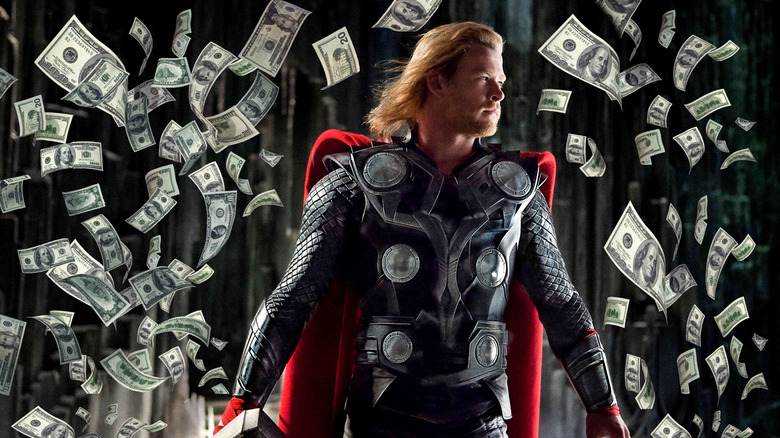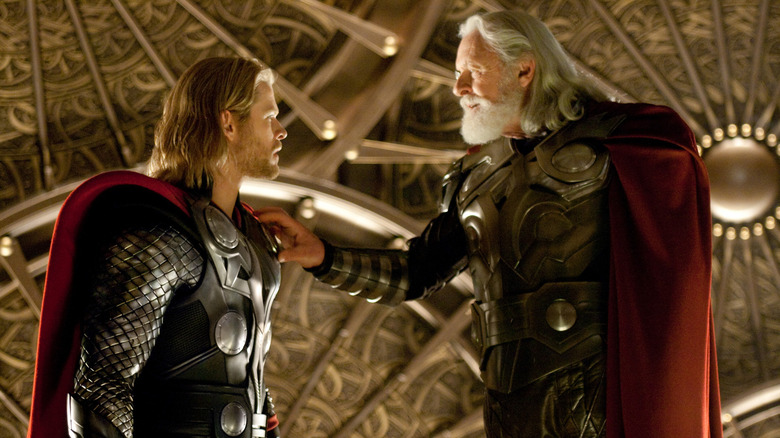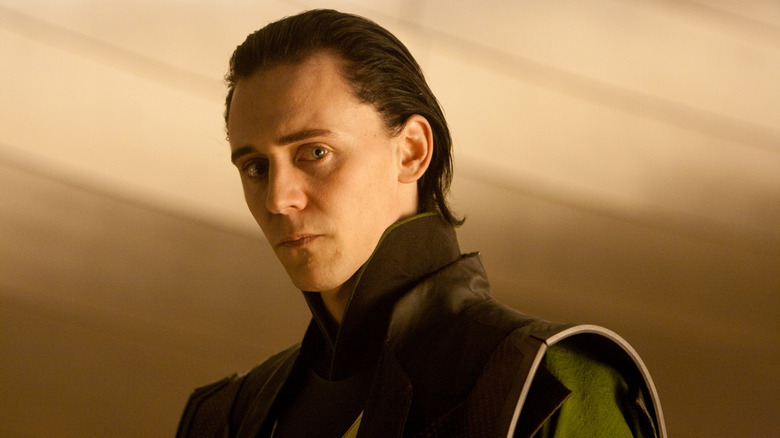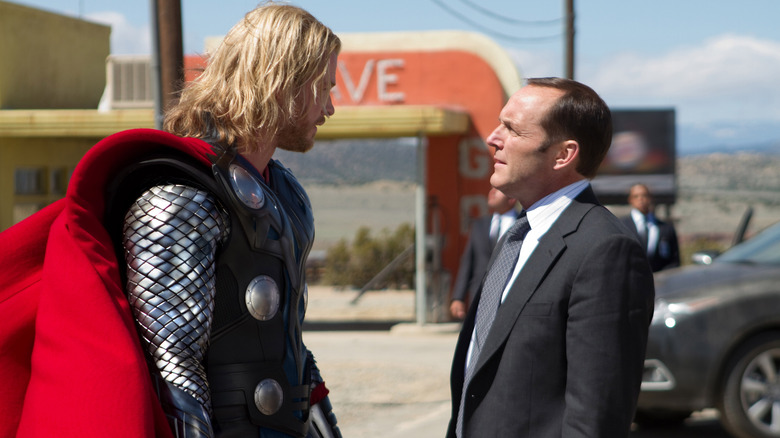Tales From The Box Office: The MCU Allowed Thor To Become A Rare Fantasy Hit
(Welcome to Tales from the Box Office, our column that examines box office miracles, disasters, and everything in between, as well as what we can learn from them.)
It is, at moments, a little easy to take for granted just how automatic the success of the Marvel Cinematic Universe has become over the years. It's amazing that "Eternals," by far the worst-reviewed movie in the history of the franchise, still managed to cross $400 million worldwide last year, even despite the box office recovery still not having nearly reached its full potential — and that's a bad result for Marvel Studios at this point. Yet, "Captain America: The First Avenger" was considered a decent success taking in $370.5 million back in 2011. The point is, we've come an awfully long way and, with the release of "Thor: Love and Thunder" this weekend, that has become evident.
The fourth solo "Thor" flick is going to easily best the competition at the box office in its opening weekend and will rank as one of the biggest opening weekends since the pandemic began, making even more than "Thor: Ragnarok" did back in 2017. All of this to say, it's amazing what relativity can do for perception. To that end, 2011's "Thor" was far from a guaranteed success at the time, even with the MCU beginning to take shape as something moviegoers cared about. Not only because we weren't dealing with an A-list superhero (at that time, anyway) but because blockbuster fantasy movies simply didn't have a great legacy of success. And, while "Thor" is primarily a superhero movie, it is also very much a fantasy film.
Today, in honor of the release of "Love and Thunder," we're going to look back at the original "Thor," how it came to be, how the MCU allowed this fantasy film disguised as a superhero flick to blossom, and what lessons we might be able to learn from it in the modern context. Let's dig in, shall we?
The movie: Thor
In the early days of Marvel Studios, the company had to make do with what it had. When "Iron Man" came out in 2008, it was all about trying to make the best movies possible with characters that were not necessarily as popular in the mainstream at the time. This is because many characters that Marvel had previously licensed to other studios during financial hardship were still elsewhere. The "X-Men" and "Fantastic Four" were at Fox, "Spider-Man" was (and still is) at Sony, and Universal still has the rights to make solo "Hulk" films. The list goes on. As such, the idea was hatched to take the pieces on the board and build to something that could make for an A-list event in the form of "The Avengers."
To do that, various individual film franchises would need to be launched and succeed on their own before the groundbreaking blockbuster crossover event could happen in 2012. "Iron Man" and "The Incredible Hulk" got things started in 2008, with "Iron Man 2" bringing us Black Widow and Nick Fury in 2010. "Thor" was then set to follow in 2011, with "Captain America: The First Avenger" serving as the final piece of the puzzle later that summer. But first, the God of Thunder needed his day in the sun.
Even though other filmmakers had tried to get a "Thor" film going over the years (including none other than Sam Raimi) it was ultimately Kenneth Branagh, known for films like "Mary Shelley's Frankenstein" and "Much Ado About Nothing," who won the job. As far as casting goes, Marvel cast a wide net that included Liam Hemsworth, the younger brother of Chris Hemsworth, who ultimately landed the gig.
A different kind of superhero tale
The thing about "Thor" is that it was always going to be radically different than other superhero films that were having success at that time. The Norse mythology that ultimately inspired Stan Lee and Steve Ditko in creating the comics is rooted in some of the oldest fantasy storytelling the world has to offer. This was about the furthest thing from "Batman" or "Spider-Man" that one could imagine. Now, it didn't hurt that the supporting cast was stacked with actors like Natalie Portman and Anthony Hopkins, as well as a then-relatively-unknown Tom Hiddleston who would go on to steal the show as Loki. Still, Marvel and Branagh were going to be forced to contend with a genre that, historically speaking, was a recipe for failure.
It is worth remembering that in 2011, very few films outside of "The Lord of the Rings" trilogy and "Harry Potter" had success in the big-budget fantasy realm. More often than not, they bombed. That's part of what made "Lord of the Rings" such a huge gamble in the first place. For example, the same year "Thor" was released, the 2011 "Conan the Barbarian" remake absolutely tanked, earning just $63 million worldwide against a $90 million budget. Heck, even Hemsworth's own "Huntsman: Winters War" would go on to collect a disastrous $164 million against a $115 million budget in 2016. Fantasy, unlike sci-fi, was not necessarily fertile ground for success in Hollywood — and honestly, it still largely isn't.
Yet, thanks to the unexpected success of "Iron Man" and "Iron Man 2," the MCU was already gaining popularity and audiences were aware that "The Avengers" was set to follow in 2012. Not so much to the degree that it is now, but even then these were becoming must-see events for moviegoers who might not otherwise have cared. As a result, this film that seemingly had so many iffy ingredients became an unlikely early hit for Marvel Studios.
The financial journey
"Thor" helped to kick off the summer season on May 6, 2011. It did so with a pretty solid bang, taking in $65.7 million on its opening weekend — good enough for the number one spot, besting Universal's "Fast Five," which was entering its second weekend. The film held reasonably well in the coming weeks, setting it up for a nice domestic run that concluded in late August. All told, the fourth MCU flick earned $181 million domestic and $268.2 million internationally for a grand total of $449.3 million against a reported $150 million production budget.
Now, by current MCU standards that number doesn't look all that great. But the fact that a straight-up fantasy film led by a then largely unknown actor managed to make three times its production budget while other huge hits like "Pirates of the Caribbean: On Stranger Tides," "Bridesmaids," and "The Hangover Part II" were in theaters is impressive, considering that the God of Thunder had nothing else for the general public to latch onto at that time. This movie was able to sell itself, especially when coupled with the promise of something bigger to come the following summer. It is also worth pointing out that "Thor" earned a reported $95 million from Blu-ray and DVD sales, illustrating that the market for ancillary revenue was much better even a decade ago.
This success, in turn, helped set up "The Avengers" for a record-breaking run in 2012, as well as "Thor" to become a big hit solo franchise in its own right, with the series recently crossing the $2 billion mark worldwide thanks to the early returns from "Love and Thunder." Not only that, but Hemsworth's hammer-swinging god became the first MCU hero to have four solo movies under his belt. All of that springs forth from a comparatively humble fantasy/superhero flick that proved the MCU could safely explore different genres on its way to becoming an all-encompassing multimedia behemoth.
The lessons contained within
The early days of the MCU are, in some ways, a masterclass in how to build up a lot of goodwill with the moviegoing public. In an age when franchises and IP are everything for studios and streaming services, it's worth looking back at movies like "Thor," which embraced what made the character an enduring figure in the comics for decades before he was ever part of a major motion picture. Taika Waititi would brilliantly reinvent this particular franchise with the irreverent "Ragnarok" in 2017, but Branagh's first film deserves credit for being earnest and embracing the character that was on the page. You can't really get to that fun reinvention without first having the classic version of the character on screen.
"Thor," as well as "Iron Man" and "Captain America: The First Avenger," fully embraced the spirit of the characters as they were, understanding that Marvel Comics had been telling great stories for decades. If that spirit could be captured in a new medium, it stands to reason that more general moviegoers might respond to the material. At the same time, the studio managed to please fans who had been embracing these characters for years who perhaps never thought they would see Loki and Hawkeye as part of a big-budget Hollywood blockbuster.
As franchises and IP continue to get recycled by everyone out there making content, it's worth remembering this simple lesson: do right by the character. I mean, we've heard Sony plans to make some pretty radical changes to Kraven for its "Kraven the Hunter" movie. Is that a good idea? Time will tell, but that's exactly the sort of thing I'm talking about. Why bother making a "Deadpool" movie if you can't let Deadpool be Deadpool. "X-Men Origins: Wolverine" failed, "Deadpool" did not. "Thor" succeeded and paved the way for something bigger by being faithful to what made the comics great.
That's not to say adaptations need to be as slavishly devoted to the source material as something like Zack Snyder's "Watchmen" movie, but don't run away from what's on the page. That's why HBO's "Watchmen" show worked so well; it managed to honor what came before while feeling true to that hugely important source material. This, to me, is a lesson inherent in the success of "Thor" and the MCU in general.




